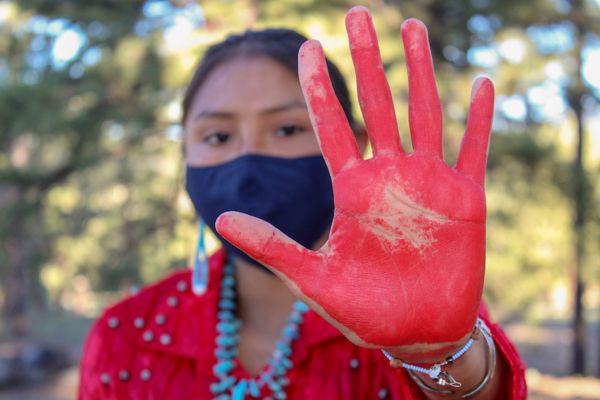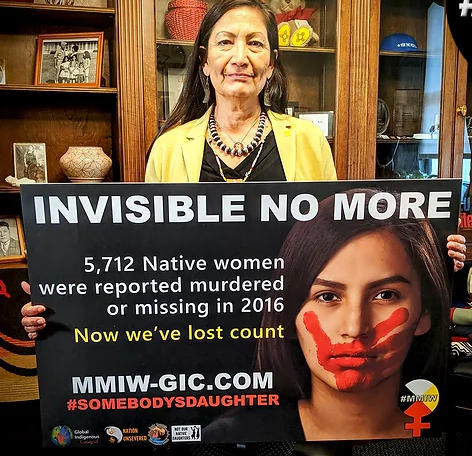Federal Commission Concludes Nationwide Tour Gathering MMIP Testimony in Billings, MT

- BY ELYSE WILD
On July 26th, the Not Invisible Act Commission (NIAC) wrapped up its final stop on a seven-city nationwide tour gathering testimony from Native Americans affected by the Missing and Murdered Indigenous Persons (MMIP) crisis.
This week’s hearing took place in Billings, Montana, where Tribal officials, Native leaders, law enforcement and government officials convened for a panel discussion and to bear witness to testimony from MMIP survivors and family members. The hearing was also live streamed.
The hearing opened with a prayer and moment of silence, followed by an invitation for those in attendance to speak the name of a missing or murdered loved one. Names were spoken aloud for ten minutes.
Among those testifying was Carrisa Heavyrunner, whose 22-year-old daughter Mika Westwolf (Blackfeet) was killed in a hit-and-run on March 31 on Highway 93 near Arlee, Montana. Despite the Montana Highway Patrol identifying the driver as Sunny K. White, no arrests have been made in Westwolf’s death.
Heavyrunner told Billings news station NonStop Local that the lack of urgency from law enforcement is slowing healing for Native American communities affected by the MMIP crisis.
“You can’t heal if you’re not able to be seen and be heard,” Heavyrunner said. “That’s why I wanted to help these women share their stories about their loved ones that they lost… We gotta keep Mika’s name and other MMIP families and victims out there because everyone tends to forget things so easily nowadays. We’ve gotta keep the momentum going.”
According to data from the Centers for Disease Control and Prevention, Native women living on reservations are murdered at a rate ten times higher than the national average. Lack of jurisdictional clarity, lack of collaboration between law enforcement bodies, and systemic apathy have led to thousands of unsolved cases in Indian Country. While there is no comprehensive data on MMIP, the Bureau of Indian Affairs estimates there are 4,200 unsolved MMIP cases have gone unsolved. The oldest MMIP case profile on the BIA’s public MMIP database dates back to 1969.
Montana is home to twelve Tribal Nations and ranks among the states with the highest number of MMIPs in the nation, according to a report from the Urban Indian Health Institute.
The 37-person Not Invisible Act Commission was launched in 2020 by Secretary of the Interior Deb Haaland (Laguna Pueblo). The commission is tasked with developing recommendations on improving intergovernmental collaboration on violent crimes in Indian Country and providing resources for survivors and victims’ families. Information and testimony gathered at the hearings will be part of the commission’s final report to Secretary Haaland, Attorney General Merrick Garland and Congress in October.
The commission will hold a nationwide virtual hearing on Aug. 1 and 2. Registration for the hearing can be found here.
Not Invisible Act Commission to Hear Testimony on MMIP in Montana

Interior Sec. Deb Haaland (Photo/File)
- BY GRACE TERRY, CONTRIBUTING WRITER
Native community members who are survivors of or have been impacted by the Missing and Murdered Indigenous Peoples (MMIP) crisis are invited to attend to share their testimony. Those who wish to attend the hearing must register at here.
Those unable to attend the hearing in person can submit written testimony, recommendations, or questions to the Not Invisible Act Commission at: NIAC@ios.doi.gov. Include the following in the subject line: “NIAC Testimony” or “NIAC Question.”
In October 2020, the Not Invisible Act of 2019 was signed into law as the first bill in history to be introduced and passed by four U.S. congressional members enrolled in their respective federally recognized tribes. The four were led by Secretary of the Interior Deb Haaland (Pueblo of Laguna) during her time in Congress.
The act was a response to the longstanding crises of MMIP and human trafficking (HT). The purpose of the act is to increase coordination in identifying and combating violent crime within Native lands and against Native Americans.
In accordance with the act, Attorney General Merrick Garland and Secretary Haaland established the Not Invisible Act Commission. The Commission is a cross-jurisdictional advisory committee composed of both federal and non-federal members. These include law enforcement, Tribal leaders, federal partners, service providers, family members of missing and murdered individuals, and survivors.
Since April, the Commission has been holding field hearings in Tulsa, Anchorage, Flagstaff, Minneapolis, and Albuquerque, some of the communities most affected by the MMIP crisis. The Billings, MT, hearing later in July is the final hearing. Similar to earlier hearings, the Billings event will provide a forum for law enforcement, subject-matter experts, organizations, State/Tribal task forces, advocates, survivors/families, and others to offer testimony directly to the Commission. Trauma-informed mental health support will be available on-site with optional follow-up support as needed.
Deputy Attorney General Lisa Monaco emphasized, “The Justice Department is steadfast in our pledge to work with Tribal governments in preventing and responding to the violence that has disproportionately harmed Tribal communities. And we are committed to listening and being responsive to what our partners have to say.”
In a June 8, 2023, letter to Tribal leaders, Secretary Haaland said, “Only with the collective participation of all our communities will our missing, murdered, or trafficked relatives and friends no longer be invisible.”
Carmen O’Leary (Cheyenne River Lakota) of Eagle Butte, SD, is the Executive Director of the Native Women’s Society of the Great Plains. According to O’Leary, “It is important to our community that the people have input, whether it is by contributing a personal story, offering a possible solution to address the problem, or helping to identify gaps in the (prevention/enforcement/service) system. The actions of the (Not Invisible Act) Commission will impact resources available to address MMIP issues for a long time.”
Findings from hearings and written testimony will shape the Commission’s final report to Secretary Haaland, Attorney General Garland, and Congress. This report is required by October 2023 and will include recommendations for how to improve intergovernmental coordination, bolster resources, and establish best practices for State/Tribal/Federal law enforcement to challenge the tragic epidemic of MMIP violence and human trafficking.
Elizabeth Hidalgo Reese is a member of Nambé Pueblo and senior policy advisor for Native American affairs at the White House. At the June 28 Not Invisible Commission hearing in Albuquerque, she acknowledged the victims and families present at the hearing and how critical their testimony is to create solutions to the crisis.
“These hearings are so important,” Hidalgo Reese said. “Neglect and invisibility are too often the cause or enable violence in our communities ... we need to understand this problem from every angle. We need to explore every possible solution, so we need to hear from all of you.
According to data from the Centers for Disease Control and Prevention, Native women living on reservations are murdered at a rate ten times higher than the national average. Layered jurisdiction, lack of collaboration between law enforcement bodies, and systemic apathy have led to thousands of unsolved cases in Indian Country. The Bureau of Indian Affairs estimates there are 4,200 unsolved MMIP cases.
Secretary Haaland made the following statement when the schedule of hearings was announced in February 2023, “This work requires each of us to face our own trauma, to relive unimaginable pain, and visualize a future in which our loved ones are safe, and our communities have closure. We’re here for our children, grandchildren, and relatives we have yet to meet. This work is urgently needed and requires all of us to work collaboratively. I am so grateful to the Commission for the work they are doing and the lasting impact they will have.”
The Commission will hold a national, virtual field hearing in August.
No comments:
Post a Comment